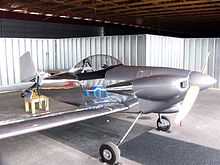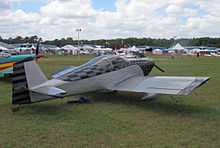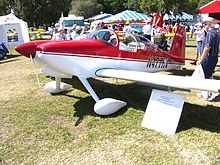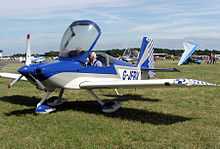Van's Aircraft
 | |
| Industry | Aerospace |
|---|---|
| Founded | 1973 |
| Headquarters |
Aurora State Airport, Oregon 045°14′32″N 122°45′57″W / 45.24222°N 122.76583°W Aurora, Oregon, United States |
| Key people | Richard VanGrunsven |
| Products | Kit aircraft |
| Employees | 65 |
| Website | www.vansaircraft.com |
Van's Aircraft is an American kit aircraft manufacturer, founded by Richard "Van" VanGrunsven in 1973.
Van's RV series of aircraft, from the single seat RV-3 to the latest RV-14, are all-aluminum, low-wing monoplanes of monocoque construction. The RV series of airplanes has been extremely successful, and by the end of 2012, about 8000 RV kits have been completed and flown, and thousands more are under construction. Completion rates currently average about 1.5 per day,[1] making the series one of the most numerous of all homebuilt aircraft. They feature responsive controls plus both good speed and fuel economy.[2][3][4] In 2013, the company announced it would begin selling some assembled aircraft as well on a limited basis.[5]
Van's factory is located at Aurora State Airport, Oregon. This airport is the location of an annual fly-in for Van's aircraft owners.[4]
Regulatory status
RVs are deemed Experimental - amateur-builts by the Federal Aviation Administration in the United States and are accepted under the corresponding category by the aviation authorities in many other countries, including the United Kingdom, Canada, New Zealand and Australia. A modified version of the RV-6 was sold to the Nigerian government as a kit-assembled military trainer.
The RV-12 is an experimental light-sport aircraft.
RV aircraft series
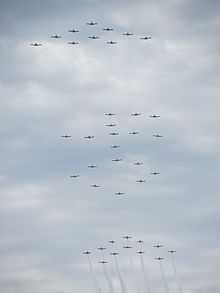
- RV-1: Single example of a Stits SA-3 Playboy built by VanGrunsven in 1965 and modified with a 125 hp (93 kW) Lycoming engine, larger tail, modified cowling, modified fuselage and a custom wing[6]
- RV-2: wooden flying wing sailplane prototype that was never completed[7]
- RV-3: single seat[7]
- RV-4: two seats, tandem, bubble canopy[7]
- RV-5: A small metal single seat prototype that was flown with a two-stroke engine[7]
- RV-6: two seats, side-by-side[7]
- RV-7: improved RV-6, with longer wingspan and larger rudder[7]
- RV-8: improved RV-4, with larger cockpit[7]
- RV-9: two seats, side-by-side; larger wing and more docile handling qualities[7]
- RV-10: four seats, tricycle gear only[7]
- RV-11: single seat, motorglider; under development
- RV-12: two seats, side-by-side Light Sport Aircraft.[8]
- RV-14: two seats, side-by-side version of the RV-10.[9]
Gallery
-
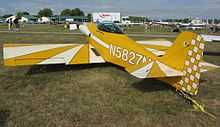
RV-1
References
- ↑ "Van's Aircraft - History". Van's Aircraft. Retrieved 16 June 2013.
- ↑ Kitplanes Staff: 2008 Kit Aircraft Directory, page 77-78, Kitplanes Magazine December 2007 Volume 24, Number 12, Belvior Publications, Aviation Publishing Group LLC.
- ↑ Vans Aircraft (August 2010). "First Flights". Retrieved 26 August 2010.
- ↑ 4.0 4.1 Van's Aircraft (2007). "Introduction - About RV Kitplanes". Retrieved 2007-12-12.
- ↑ Goldfield, Robert (April 16, 2013). "For plane kit maker, assembly no longer required". Portland Business Journal. Retrieved 19 April 2013.
- ↑ Pew, Glenn (27 March 2012). "Van's "RV-1" -- The First Of The Breed". AVweb. Retrieved 28 March 2012.
- ↑ 7.0 7.1 7.2 7.3 7.4 7.5 7.6 7.7 7.8 Van's Aircraft (2008). "Introduction - About RV Kitplanes". Retrieved 2008-09-21.
- ↑ AvWeb Staff (April 2000). "Vans RV-12 Light Sport Aircraft". Retrieved 2008-04-11.
- ↑ Grady, Mary (24 July 2012). "Van's Introduces RV-14, Up-sized Two-Place". Retrieved 25 July 2012.
External links
| ||||||||
| ||||||||||||||
